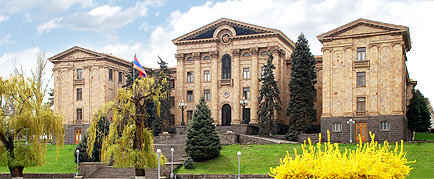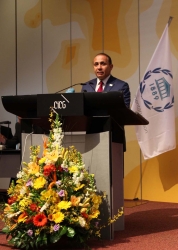The delegation led by the RA NA President, Head of the NA delegation to the Inter-Parliamentary Union (IPU) Hovik Abrahamyan took part in the 130th Assembly of the Inter-Parliamentary Union at Geneva on March 17. Karen Chshmaritian, Heghine Bisharyan and Karine Atshemyan are in the delegation led by the NA President.
In the morning the meeting of the IPU Governing Council was held, after, which the IPU 130th Assembly began its works. Parliamentary delegations of about 150 countries were taking part in the works of the Assembly.
The theme of the first meeting was “The IPU at 125: Renewing Our Commitment to Peace and Democracy.” The RA NA President delivered a speech. Addressing the attendees he said:
“I would like to start my statement by extending our congratulations to all of us on a memorable occasion. This year the Inter-Parliamentary Union (IPU) is turning 125, an organization that from the outset of its existence has been committed to the principles it had declared – peace, respect for human rights and democracy. These are the ideas, which have always been and are in the focus of the IPU and have become its pillars.
The 1997 Universal Declaration on Democracy reads: ‘The democratization process and representative institutions will greatly contribute to attaining peace and democracy. The IPU promotes the establishment of pluralistic systems of representative government’.
The problems related to the most vulnerable groups of society – women and children, in particular during wars and conflicts, discussion on migrant issues, environmental and other global matters hold a specific place in the activity of the IPU. The IPU is one of the unique organizations dealing with the human rights of parliamentarians and to that end has established a special committee.
The IPU has a timely response to the challenges facing the international community, be it the global financial crisis, security-related issues or situations in different states, thus contributing to discussions on the afore-mentioned issues and proposed solutions.
Peace and democracy underlie also the domestic and foreign policy of our country – the Republic of Armenia. It is already for several years that reforms have been underway in our country, and they aim at establishment of democracy and civil society, defence of human rights. In this context, I would like to refer to the first regional conference on the rights of the child, held in Armenia in cooperation with the IPU, UNICEF and the Armenian National Assembly.Yerevan stands ready to host other important inter-parliamentary events, too. I strongly hope that the new IPU Secretary General will keep this issue on the agenda.
The Armenian National Assembly attaches great importance to the development of civil society. Our parliament has become a rostrum of pluralism for both the parliamentary and extra-parliamentary forces. To this end parliamentary hearings are held, special ad hoc committees are being set up, where the representatives of the authorities, the opposition and NGOs deliberate on matters our society is concerned with. It is common knowledge that parliaments which cooperate with civil society, function more efficiently. Being committed to this approach, the Armenian parliament is implementing the above-mentioned principle by actively engaging all walks of the life.
Referring to one of the most crucial points of our organization and today’s agenda, which is one of the greatest values for us all – peace, I wish to draw your attention to the following matter.
Many of you are, undoubtedly, aware of the Nagorno Karabagh conflict and efforts of the international community to solve it. The OSCE Minsk Group endowed with an international mandate, has been working to this end for already 20 years. The co-chairs of the Group – the United States of America, the Russian Federation and France, are working towards the peaceful settlement of the conflict within the framework of three internationally accepted principles: self-determination of nations, territorial integrity and non-use or threat of force, which as a solution implies consensus.
Regrettably, Azerbaijan prefers only one of the above-mentioned principles – that of territorial integrity. Such an approach contravenes the idea of the peaceful settlement and is a stalemate for the entire negotiating process. Moreover, the frequent bellicose rhetoric from Baku does not contribute to the negotiating process, thus whittling down the efforts of the international community.
Unlike the Azeri authorities, the leadership and the people of the Nagorno Karabagh Republic and Armenia are strongly committed to the peaceful solution of the problem within the framework of the OSCE Minsk Group.
The Nagorno Karabagh Republic is a state, whose population has already held several parliamentary, presidential and local self-government elections, which, inter alia, were assessed by the international observers as free and fair. In the NKR a democratic society is being shaped, large-scale democratic reforms are underway, and a young generation is growing up, which does not imagine its homeland Karabagh within Azerbaijan.
Dear Colleagues,
Democracy cannot last without a democratic culture. It requires on-going education of the public, and its main responsibility lies with the political elite. We, parliamentarians, as elected popular representatives, should work for deepening democracy, since it is the only way to strengthen the statehood, develop the state and secure a more prosperous future for the society.”
The RA NA President delivered a speech. Addressing the attendees he said:
“I would like to start my statement by extending our congratulations to all of us on a memorable occasion. This year the Inter-Parliamentary Union (IPU) is turning 125, an organization that from the outset of its existence has been committed to the principles it had declared – peace, respect for human rights and democracy. These are the ideas, which have always been and are in the focus of the IPU and have become its pillars.
The 1997 Universal Declaration on Democracy reads: ‘The democratization process and representative institutions will greatly contribute to attaining peace and democracy. The IPU promotes the establishment of pluralistic systems of representative government’.
The problems related to the most vulnerable groups of society – women and children, in particular during wars and conflicts, discussion on migrant issues, environmental and other global matters hold a specific place in the activity of the IPU. The IPU is one of the unique organizations dealing with the human rights of parliamentarians and to that end has established a special committee.
The IPU has a timely response to the challenges facing the international community, be it the global financial crisis, security-related issues or situations in different states, thus contributing to discussions on the afore-mentioned issues and proposed solutions.
Peace and democracy underlie also the domestic and foreign policy of our country – the Republic of Armenia. It is already for several years that reforms have been underway in our country, and they aim at establishment of democracy and civil society, defence of human rights. In this context, I would like to refer to the first regional conference on the rights of the child, held in Armenia in cooperation with the IPU, UNICEF and the Armenian National Assembly.Yerevan stands ready to host other important inter-parliamentary events, too. I strongly hope that the new IPU Secretary General will keep this issue on the agenda.
The Armenian National Assembly attaches great importance to the development of civil society. Our parliament has become a rostrum of pluralism for both the parliamentary and extra-parliamentary forces. To this end parliamentary hearings are held, special ad hoc committees are being set up, where the representatives of the authorities, the opposition and NGOs deliberate on matters our society is concerned with. It is common knowledge that parliaments which cooperate with civil society, function more efficiently. Being committed to this approach, the Armenian parliament is implementing the above-mentioned principle by actively engaging all walks of the life.
Referring to one of the most crucial points of our organization and today’s agenda, which is one of the greatest values for us all – peace, I wish to draw your attention to the following matter.
Many of you are, undoubtedly, aware of the Nagorno Karabagh conflict and efforts of the international community to solve it. The OSCE Minsk Group endowed with an international mandate, has been working to this end for already 20 years. The co-chairs of the Group – the United States of America, the Russian Federation and France, are working towards the peaceful settlement of the conflict within the framework of three internationally accepted principles: self-determination of nations, territorial integrity and non-use or threat of force, which as a solution implies consensus.
Regrettably, Azerbaijan prefers only one of the above-mentioned principles – that of territorial integrity. Such an approach contravenes the idea of the peaceful settlement and is a stalemate for the entire negotiating process. Moreover, the frequent bellicose rhetoric from Baku does not contribute to the negotiating process, thus whittling down the efforts of the international community.
Unlike the Azeri authorities, the leadership and the people of the Nagorno Karabagh Republic and Armenia are strongly committed to the peaceful solution of the problem within the framework of the OSCE Minsk Group.
The Nagorno Karabagh Republic is a state, whose population has already held several parliamentary, presidential and local self-government elections, which, inter alia, were assessed by the international observers as free and fair. In the NKR a democratic society is being shaped, large-scale democratic reforms are underway, and a young generation is growing up, which does not imagine its homeland Karabagh within Azerbaijan.
Dear Colleagues,
Democracy cannot last without a democratic culture. It requires on-going education of the public, and its main responsibility lies with the political elite. We, parliamentarians, as elected popular representatives, should work for deepening democracy, since it is the only way to strengthen the statehood, develop the state and secure a more prosperous future for the society.”





